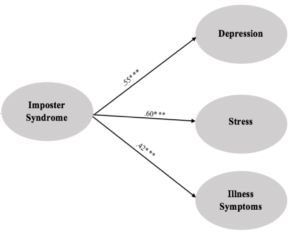What is imposter syndrome?
In 1985, Dr. Pauline Clance defined imposter syndrome as the inability to internalize one’s success, attributing any success or accomplishment to external factors such as luck, networking or “being in the right place at the right time”. In addition, individuals with imposter syndrome have a fear of not being able to repeat successful outcomes, and eventually being exposed as “frauds”.
In other words, imposter syndrome is a negative psychological experience that involves shame, undervaluing one’s accomplishments, and a fear of being discovered as a fraud. More often than not, people see you as a capable, ambitious, and/or accomplished individual, while you see yourself as fake and inadequate, but perhaps lucky.
Why is imposter syndrome bad for you?
It is normal to feel incompetent at times, especially when starting something new, or in the process of learning. However, imposter syndrome is more harmful than simply feeling incompetent temporarily; it is a persistent negative mental and emotional state that affects the person’s experience in the long-term.

Many studies have demonstrated the negative effects of imposter syndrome on mental and physical health, as well as performance. For example, Sverdlik et al., (2020) showed that imposter syndrome is strongly related to experiences of depression, stress, and physical illness symptoms.
Another reason that imposter syndrome is a problematic experience, is that those individuals who experience imposter syndrome tend to avoid risks. Taking professional risks, such as undertaking more responsibility, asking for a promotion, or presenting an idea for change, focuses peoples’ attention on the individual’s skills, capabilities, and contribution. Since individuals with imposter syndrome believe themselves not to be capable, the last thing they would want is to draw attention to their skills! Instead, they focus their efforts on “impression management”, or ways to make themselves “appear” competent in the eyes of others, instead of actually working to increase competence. Therefore, imposter syndrome hinders future growth.
What are the types of imposter syndrome?
In its foundation, imposter syndrome is about one’s core beliefs about what competence is. While everyone has a different and unique view of what it means to be skillful, individuals with imposter syndrome tend to look at competence in more absolute terms.
Valerie Young classifies imposter syndrome into 5 main types:
- The Perfectionist- this is the individual who feels like an imposter if something is not perfect- if there is a flaw, even a minor one, in their performance.
- The Expert- the expert believes that they must know everything about their domain of competence. An inability to answer a question or a display of lack of knowledge cause immense shame and feeling like a failure.
- The Soloist- a person with this type of imposter syndrome will try to accomplish everything on their own. To them, true competence is being able to do everything by yourself, and either delegating or asking for help can feel like a failure.
- The Natural Genius- do you feel like an imposter because skill development is difficult for you? If so, you might be a Natural Genius type. Here, competence is measured in terms of ease and speed, and the experience of struggling with understanding, performing, or mastering a skill can feel shameful.
- The Superhuman- finally, the superhuman measures competence based on how many of their life roles they can excel in- professionally, as a partner, parent, friend, sibling, etc. facing challenges in any of these roles, even while doing very well in the other ones, can make them feel like a failure.

What can I do if I have imposter syndrome?
Imposter syndrome is complicated, and can be difficult to eliminate. However, there are two things that you can do today to start tackling your imposter syndrome:
- Evaluate your expectations. What do you believe about competent people? Do they know everything? Have all the answers? Is everything easy for them? Understanding how you view competence may help you uncover just how unrealistic your worldview is, and adjust your expectation for yourself.
- Talk to people who you deem competent! Sometimes imposter syndrome is a result of a lack of transparency about the struggles and failures of developing skills or achieving goals. This lack of transparency can make it seem like we are the only ones struggling, while everyone else is going through the same process with ease. Having candid conversations with others can give you a more realistic view of competence development, and allow you to feel adequately capable for where you are in your competence development journey.

About the author
Dr. Anna Sverdlik is the founder of Melioscope. Since 2011, she has been specializing in uncovering organizational structures that shape motivation, engagement, and well-being.
